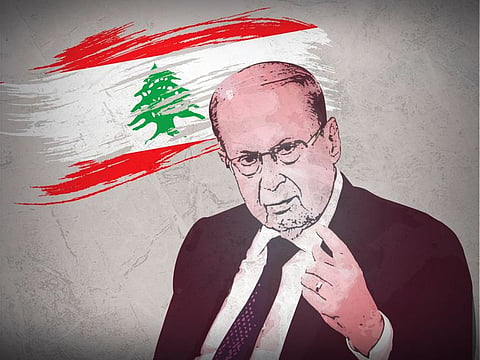Lebanon headed towards a presidential vacuum
The current situation and stalemate may also lead to extension of Michel Aoun’s mandate

For those who doubt, it’s now becoming crystal clear. Lebanon will likely fail to elect a new president anytime between now and end of incumbent president Michel Aoun’s term on October 30, 2022. Reasons vary, starting with world powers locked down in the Ukraine issue and either unable, or unwilling, to cooperate on Lebanon.
There is no consensus candidate agreed upon by the country’s rival political parties, amid instance of the president’s son-in-law Gibran Basil to succeed him at Baabda Palace. Bassil is telling the world that if he is not next-in-line for president, then nobody is — suggesting that Aoun would get to stay in his job for an indefinite period.
That can’t be too long given the president’s age (he turned 89 on Friday), but it’s a doomsday scenario that everybody is trying to avoid, given the legacy of his first six years in office, which witnessed a terrible economic and financial meltdown, along with a deadly blast at the port of Beirut, which killed over 200 people and tore down half the city.
Extension of Aoun’s term
Aoun’s legal advisers claim that according to the constitution, a new president cannot be sworn-in unless there is a full-fledged government in power, approved by the Chamber of Deputies.
That currently doesn’t apply to the cabinet of Prime Minister Najib Mikati, which went into caretaker mode after last May’s parliamentary elections. Since then, Mikati has been unable to come up with a new government, due mainly to impossible conditions put forth by Bassil and his Free Patriotic Movement (FPM).
Bassil is unpopular, even among Lebanese Christians, and has been sanctioned by the United States since 2020. Had Bassil made a floor nomination, then he would have received no more than 21 votes (17 of them from his own Free Patriotic Movement).
Although Frangieh commands a far smaller bloc of 2 MPs, he is supported by the twin Shiite parties Hezbollah and Amal (34 MPs) and by the Social Progressive Party of Walid Jumblatt (8 MPs). Yet if it comes down to choosing between Bassil and Frangieh, even independents would vote for the later, and so would right-wing Christians in the Lebanese Forces (LF), headed by Samir Gagegea.
Gagegea is a lifelong opponent of Michel Aoun, and by extension, of Gibran Bassil as well. Each claim to represent the Maronite Christians of Lebanon, a position that has put them at daggers-end since the 1980s.
Gagegea is willing to move heaven and earth to prevent an extension of Aoun’s term, or a Bassil presidency, even if it means voting for Suleiman Frangieh, a ranking member of the Hezbollah-led 8 March Coalition.
First round of voting
During the first round of voting on Thursday, Gagegea’s 19 MPs voted for Michel Mouawwad as president, an MP for the town of Zghorta whose father had briefly served as president in 1989, before he too was assassinated during the last stages of the civil war.
By voting for a Zghorta native, Gagegea hoped to bury the 44-year-old blood feud between him and the Zghortans, regardless if Mouwwad made it to the presidency or not.
Mouawwad got a total of 36 votes, from Gagegea, Walid Jumblatt’s Druze bloc, from the Lebanese Phalange, and a handful of parliamentary newcomers.
Another independent, Sami Edde, got 11 votes. Neither of them is a serious candidate, since they have no political party behind them, no parliamentary bloc, and no regional or international support. Ten votes were disqualified for carrying the word “Lebanon” on the ballot, while 63 blank votes were cast by Hezbollah, Amal, and Bassil’s FPM.
The Berri initiative
Given that no consensus was reached, the session ended in failure. Parliament Speaker Nabih Beri is still expected to call for another session between now and 31 October. He too supports Frangieh for president, rather than Bassil.
To pressure rival Christian parties into getting their act together, the octogenarian speaker has threatened to hand over presidential powers to Prime Minister Mikati, if they don’t agree on a new president between now and October.
That suggestion struck a raw nerve among Maronite Christians, who dread the idea of presidential powers — in their hands since 1934 — going to a Sunni Muslim. According to a gentlemen’s agreement dating back to 1943, presidential office in Lebanon is reserved for Maronite Christians while that of premier goes to a Sunni Muslim.
This puts us before two scenarios for the foreseeable future — both bad. First is for Aoun to automatically extend his term beyond 31 October, if no cabinet is formed between now and then. Gibran Bassil will use his influence to make sure that neither Mikati, nor anybody else, succeeds in forming a government.
The second option is to go by the Berri initiative, which means that Najib Mikati will end up as Lebanon’s first acting Muslim president — for lack of better alternative. A third option is for Gibran Bassil to abandon his ambition and support Suleiman Frangieh for president.
For now, that doesn’t seem to be on the table, and all sides seem to be bracing themselves either for a presidential vacuum, or 1-2 more years of Michel Aoun.
— Sami Moubayed is a Syrian historian and former Carnegie scholar. He is also author of Under the Black Flag: At the frontier of the New Jihad.
Sign up for the Daily Briefing
Get the latest news and updates straight to your inbox



